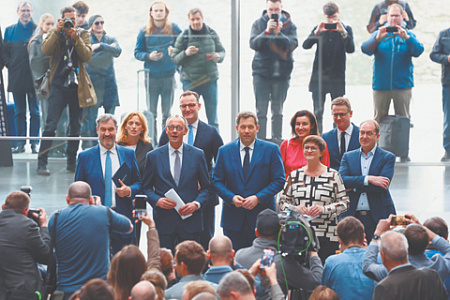
On Wednesday, April 9, at 3 p.m. Berlin time, the Christian Democratic and Christian Social Union (CDU/CSU) bloc and the Social Democratic Party of Germany (SPD) announced that they had agreed on a coalition agreement. Three hours later, it was discussed at a meeting of the factions in the Bundestag. The document has 130 pages, and it reflects the concessions made by the Conservatives and the Social Democrats to achieve unity.
The concessions stipulated in the coalition agreement relate primarily to tax and pension issues. Payments to Ukrainian refugees will be reduced. The number of ministries will increase from 15 to 16 due to the creation of the Ministry of Space Research.
The Social Democrats will receive seven ministries, including the Ministry of Defense, headed by Boris Pistorius again. The SPD will also be entrusted with the ministries of finance and justice. The Ministry of Foreign Affairs and the Ministry of Economy will be transferred to the CDU. And the CSU will receive the Ministry of Agriculture and the Ministry of Agriculture.
The approval of the coalition agreement paves the way for the creation of a new government headed by the Chancellor, which will be CDU leader Friedrich Merz. However, Alexander Dorbrindt, head of the CSU negotiating group, still believes that the chancellor’s confirmation will take place in the Bundestag only in early May. He attributes this to the fact that the coalition agreement has yet to be approved by the SPD members. Moreover, it is still unclear in what form this will happen – at the congress or through a poll.
Meanwhile, the German magazine Stern published the results of recent polls conducted by the RTL television company. They concerned the consequences of US President Donald Trump’s imposition of customs tariffs against EU countries. The United States rejected Brussels’ proposal to waive reciprocal duties on industrial goods. Namely, these goods form the basis of German exports to the United States, and they are subject to a 25% duty by the Americans. The automotive industry, which is already characterized by crisis phenomena, is under attack.
On the other hand, the outbreak of the trade war between the United States and China led to the collapse of the German stock markets last Tuesday. The fact is that both the American and Chinese markets are the most important export destinations for Germany. The introduction of mutual duties by the United States and China will hit the German industry. There will simply be no one to buy her products.
Polls show the pessimistic mood of the German population. Every second respondent believes that increased duties on German goods will plunge the country into a new recession. At the early elections in February this year, there was still hope that the new government would be able to revive the situation due to the new levers of influence on the economy promised by the conservatives.
Under the current conditions, according to polls, 52% of Germans support the decision of the EU Commission to impose counter duties on American goods supplied to Germany. They will affect products such as motorcycles, jeans, whiskey. But economists believe that any increase in duties has a negative impact primarily on consumers due to rising prices. 57% of Germans are convinced that the new government will not be able to overcome the recession.
It is this circumstance that casts doubt on Merz’s ability to fulfill his promises and lead the country out of the economic impasse. Two thirds of the respondents believe that he will not be able to solve the problems facing Germany. Therefore, 60% of respondents considered Merz unsuitable for the post of chancellor.
However, it is not the voters who should decide the fate of Merz, but the deputies. There is no evidence yet that any of the parliamentarians have spoken out against him. Among the Christian Democrats, no more than a third of the party’s members doubt Merz’s ability to lead the country out of recession.
